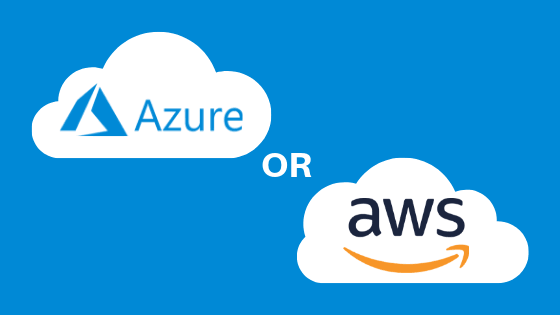Cloud computing has become the cornerstone of modern IT infrastructure, offering businesses the flexibility, scalability, and cost-effectiveness they need to thrive in today’s digital landscape. Two behemoths in this realm are Microsoft Azure and Amazon Web Services (AWS), both vying for dominance in the ever-expanding cloud market.
Understanding Azure and AWS
Azure
Developed by Microsoft, Azure provides a comprehensive suite of cloud services, including computing, storage, networking, databases, and more. It’s particularly popular among enterprises already invested in Microsoft technologies.
AWS
Amazon’s AWS is the undisputed leader in the cloud computing market, offering a vast array of services ranging from computing and storage to artificial intelligence and machine learning.
The Showdown: Features and Services
Compute Services
Azure offers Virtual Machines (VMs), Azure Functions for serverless computing, and Azure Kubernetes Service (AKS) for container orchestration. AWS boasts Elastic Compute Cloud (EC2) for scalable computing, Lambda for serverless computing, and Elastic Container Service (ECS) for container management.
Storage Solutions
Azure provides Blob Storage, File Storage, and Queue Storage, while AWS offers Simple Storage Service (S3), Elastic Block Store (EBS), and Glacier for archival storage.
Pricing Models
Both Azure and AWS offer various pricing models, including pay-as-you-go, reserved instances, and spot instances. However, the exact cost can vary based on factors like usage, region, and specific services utilized.
Scalability and Performance
Both platforms offer robust scalability, allowing businesses to scale resources up or down based on demand. Performance-wise, both Azure and AWS provide high-performance computing capabilities to handle even the most demanding workloads.
Security and Compliance
Azure and AWS prioritize security, offering encryption, identity and access management, and compliance certifications to ensure the protection of sensitive data and adherence to regulatory requirements.
The Verdict
Choosing between Azure and AWS ultimately depends on your organization’s specific needs, preferences, and existing infrastructure. While Azure may appeal to businesses already entrenched in the Microsoft ecosystem, AWS offers unparalleled scalability and a vast array of services.
Final Thoughts
As the battle between Azure and AWS rages on, businesses can benefit from the fierce competition, with both platforms continually innovating and expanding their offerings. Whether you choose Azure or AWS, rest assured that you’re harnessing the power of cutting-edge cloud technology to propel your business forward.
In the end, it’s not about declaring a winner in the Azure vs AWS showdown—it’s about finding the right fit for your unique requirements and leveraging the capabilities of these cloud computing giants to drive success.
The Future of Cloud Computing
As technology continues to evolve, so too will Azure and AWS. Both platforms are investing heavily in research and development to stay ahead of the curve and address emerging trends such as artificial intelligence, machine learning, and edge computing.
How can TechDotBit help you about Cloud Computing?
TechDotBit can provide expert analysis, migration guidance, optimization strategies, and security solutions for navigating the complexities of cloud computing, particularly in the context of Azure and AWS.
Reach out to us today in order to learn more about how we can help you about Cloud Computing for your organization.
Conclusion
In the dynamic landscape of cloud computing, Azure and AWS stand out as the titans of the industry. Their ongoing battle for supremacy drives innovation, fosters competition, and ultimately benefits businesses worldwide.
Whether you choose Azure or AWS, you’re tapping into a wealth of resources, expertise, and cutting-edge technology to propel your organization into the future of computing.
In the end, the battle between Azure and AWS isn’t just about choosing a provider—it’s about embracing the transformative power of cloud computing to unlock new possibilities and drive unprecedented growth and success for your business.
FAQs (Frequently Asked Questions)
- Which is better: Azure or AWS? Both Azure and AWS have their strengths and weaknesses, so the choice depends on your specific needs and preferences. Azure might be more appealing if your organization already uses Microsoft technologies, while AWS might offer more flexibility and scalability in certain scenarios.
- Is Azure cheaper than AWS? The cost comparison between Azure and AWS depends on various factors such as usage patterns, service selection, and discounts. It’s recommended to conduct a thorough cost analysis based on your specific requirements before making a decision.
- Can I use both Azure and AWS together? Yes, many organizations use a multi-cloud approach, leveraging both Azure and AWS for different workloads or redundancy purposes. However, managing multiple cloud platforms can add complexity, so it’s essential to have a clear strategy and proper management tools in place.
- Which platform is more secure: Azure or AWS? Both Azure and AWS offer robust security features and compliance certifications. The security level ultimately depends on how well you configure and manage your resources on the platform. It’s essential to follow best practices for security and regularly update your security measures.
- How can I migrate my applications to Azure or AWS? Migrating applications to Azure or AWS requires careful planning and execution. Both platforms offer tools and services to facilitate the migration process, such as Azure Migrate and AWS Server Migration Service. It’s crucial to assess your current environment, prioritize workloads, and create a migration plan tailored to your specific needs.








